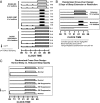Quantification of sleep behavior and of its impact on the cross-talk between the brain and peripheral metabolism
- PMID: 21852576
- PMCID: PMC3176603
- DOI: 10.1073/pnas.1101338108
Quantification of sleep behavior and of its impact on the cross-talk between the brain and peripheral metabolism
Abstract
Rates of obesity have been steadily increasing, along with disorders commonly associated with obesity, such as cardiovascular disease and type II diabetes. Simultaneously, average sleep times have progressively decreased. Recently, evidence from both laboratory and epidemiologic studies has suggested that insufficient sleep may stimulate overeating and thus play a role in the current epidemic of obesity and diabetes. In the human sleep laboratory it is now possible to carefully control sleep behavior and study the link between sleep duration and alterations in circulating hormones involved in feeding behavior, glucose metabolism, hunger, and appetite. This article focuses on the methodologies used in experimental protocols that have examined modifications produced by sleep restriction (or extension) compared with normal sleep. The findings provide evidence that sleep restriction does indeed impair glucose metabolism and alters the cross-talk between the periphery and the brain, favoring excessive food intake. A better understanding of the adverse effects of sleep restriction on the CNS control of hunger and appetite may have important implications for public health.
Conflict of interest statement
The authors declare no conflict of interest.
Figures




References
-
- Ogden CL, et al. Prevalence of overweight and obesity in the United States, 1999-2004. JAMA. 2006;295:1549–1555. - PubMed
-
- Bonnet MH, Arand DL. 24-Hour metabolic rate in insomniacs and matched normal sleepers. Sleep. 1995;18:581–588. - PubMed
-
- Centers for Disease Control and Prevention. QuickStats: Percentage of adults who reported an average of < 6 hours of sleep per 24-hour period, by sex and age group—United States, 1985 and 2004. MMWR. 2005;54:933.
-
- National Sleep Foundation. Sleep in America Poll. Washington, DC: National Sleep Foundation; 2008.
-
- Kripke D, Simons R, Garfunkel L, Hammon E. Short and long sleep and sleeping pills. Is increased mortality associated? Arch Gen Psychiatry. 1979;36:103–116. - PubMed
Publication types
MeSH terms
Grants and funding
LinkOut - more resources
Full Text Sources
Medical

